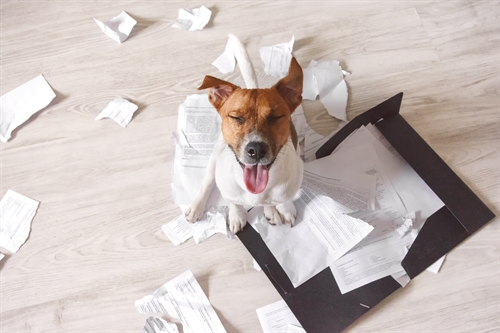How well does your dog manage with change? If you’ve got a highly-strung pet that likes his routine and a familiar setting, then big life events like moving house are a huge deal. A new living space is a big challenge because everything familiar to your dog will be different, from the smells to the layout to the routine. But there are ways to ease your dog’s transition from old home to new.
Get help with moving your dog
Some dog owners who are planning an international move, opt to use the services of a dedicated animal courier, such as PBS, which has the equipment and expertise needed to relocate your canine companions safely and humanely.
Moving day is stressful for humans, let alone dogs, with lots of activity and unfamiliar people around. So it may be best to ask a friend or relative to care for your dog, or use a dog sitter. Putting your dog into kennels for the duration of the move might be another option – but some dogs find this a particularly stressful experience.
If you need to keep your dog with you on moving day, confine him to one room and let your moving helpers and remove staff know where your dog is so they don’t accidentally let him out. It can help to make one family member responsible for the dog.
Do some admin before moving house with your dog
In planning your house move, remember to pick up your pet admin. This might include registering with a new vet. You’ll also want to tag your dog’s microchip with your new address. There are several UK pet microchip databases and they all have different procedures for updating details; but it’s usually just a question of visiting the pet microchip website or sending an email to notify of a change of address.
You may also wish to share a description of your pet and your contact details with the new occupiers of your home in case your dog strays and makes its way back there.
Consider the logistics of transporting your dog to the new house
You’ll need to take all the usual safety precautions when bringing your dog to the new house, for example a crate or harness in the back of your car. Some dogs will need to be crate-trained ahead of the move, and the Blue Cross has some advice on this.
And if you’re making multiple trips back and forth between your old and new home, will there be someone to wait with your dog?
Try to plan your move in a way that puts less pressure on you. For example, can you get access to your new home before the date you need to be out of your old home? Or you can check out some of our tips for a low-stress, safe house move. Some people move part of their domestic goods into self-storage for a few days or weeks. This allows them to unpack at leisure and rearrange furniture more easily. When you insure your stored items with Store and Insure, you only pay for the days your things are in storage.
Keep your dog comfortable during the journey to your new home
Plan your packing so you don’t have to overfill your car, and remember to leave space in your vehicle for the dog, too. Break up long journeys, and never leave your dog unattended in the car.
Ensure your dog has access to water throughout moving day, and don’t forget her regular meal times and toilet times. Get advice from your vet if your dog suffers from travel sickness.
Have a room ready for your dog at the new house
At the new house, unpack your dog’s toys and bedding first and put them in a secure room. This will give your dog a safe quiet space in which to get used to the new setting. Again, don’t forget water.
Get your dog used to their new surroundings
Some dogs will be better kept on the leash when you take them outside until they are familiar with the garden of your new house. When you take them out walking, a dog with good recall should be fine – but if you’ve got doubts, use a leash.
We hope these tips will help your moving day go as smoothly as possible – for you and your pets.



